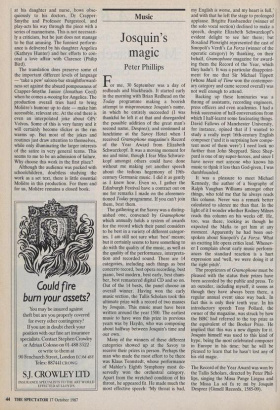Music
Josquin's magic
Peter Phillips
Er me, 30 September was a day of redheads and blackheads. It started early in the morning with Brian Redhead on the Today programme making a boorish attempt to mispronounce Josquin's name, in which he entirely succeeded (I was thankful he left it at that and disregarded the possible addition of the great man's second name, Desprez); and continued at lunchtime at the Savoy Hotel when I received Gramophone magazine's Record of the Year Award from Elizabeth Schwarzkopf. It was a moving moment for me and mine, though I fear Miss Schwarz- kopf amongst others could have done without me making yet another speech about the tedious hegemony of 19th- century Germanic music. I did it as gently as I knew how. Even so, I gather the Edinburgh Festival have a contract out on me for remarks I made on the aforemen- tioned Today programme. If you can't join them, beat them.
The gathering at the Savoy was a disting- uished one, convened by Gramophone which annually holds a system of awards for the record which their panel considers to be best in a variety of different categor- ies. I am still not sure what 'best' means; but it certainly seems to have something to do with the quality of the music, as well as the quality of the performance, interpreta- tion and recorded sound. There are 14 categories, including such things as best concerto record, best opera recording, best piano, best modern, best early, best cham- ber, best remastered digital CD and so on. Out of the 14 bests, the panel choose an overall winner. Having won the early music section, the Tallis Scholars took this ultimate prize with a record of two masses by Josquin. This music must have been written around the year 1500. The earliest music to have won this prize in previous years was by Haydn, who was composing about halfway between Josquin's time and our own.
Many of the winners of these different categories showed up at the Savoy to receive their prizes in person. Perhaps the man who made the most effort to be there was Klaus Tennstedt, whose performance of Mahler's Eighth Symphony most de- servedly won the orchestral category. Apart from the wretched condition of his throat, he appeared fit. He made much the most effective speech: 'My throat is bad, my English is worse, and my heart is full,' and with that he left the stage to prolonged applause. Brigitte Fassbaender (winner of the solo vocal section) declined to make a speech, despite Elizabeth Schwarzkopf s evident delight to see her there; but Rosalind Plowright represented the cast of Sinopoli's Verdi's La Forza (winner of the operatic category) by thanking, on their behalf, Gramophone magazine for award- ing them the Record of the Year, which they hadn't. It was a particular disappoint- ment for me that Sir Michael Tippett (whose Mask of Time won the contempor- ary category and came second overall) was not well enough to attend.
Backing up these luminaries was a throng of assistants, recording engineers, press officers and even academics. I had a brisk succession of half-conversations from which I half-learnt some fascinating things. David Fallows of Manchester University, for instance, opined that if I wanted to study a really inept 16th-century English composer ('and it is surprising how compe- tent most of them were') I need look no further than John Sheppard. Since Shep- pard is one of my super-heroes, and since I have never met anyone who knows his music to tink it less than God-given, I was dumbfounded.
It was a pleasure to meet Michael Kennedy, the author of a biography of Ralph Vaughan Williams amongst other things, who told me that he always reads this column. Never was a remark better calculated to silence me than that. In the light of it I wonder whether Rodney Milnes reads this column on his weeks off. He, too, was there, looking as though he expected the Mafia to get him at any moment. Apparently he had been out- spoken about Sinopoli's La Forza. What an exciting life opera critics lead. Whenev- er I complain about early music perform- ances the standard reaction is a hurt expression and 'well, we were doing it at the right pitch'.
The proprietors of Gramophone must be pleased with the status their prizes have been accorded by the public and press. To an outsider, including myself, it seems as though they have always been there, a regular annual event since way back. In fact this is only their tenth year. In his introductory speech Tony Pollard, the owner of the magazine, was struck by how the BBC had referred to the top prize as the equivalent of the Booker Prize. He implied that this was a new dignity for it. Josquin himself was used to this kind of hype, being the most celebrated composer in Europe in his time; but he will be pleased to learn that he hasn't lost any of his old magic.
The Record of the Year Award was won by the Tallis Scholars, directed by Peter Phil- lips, singing the Missa Pange Lingua and the Missa La sol fa re rni by Josquin Desprez (Gimell Records, 1585-09).


























































 Previous page
Previous page